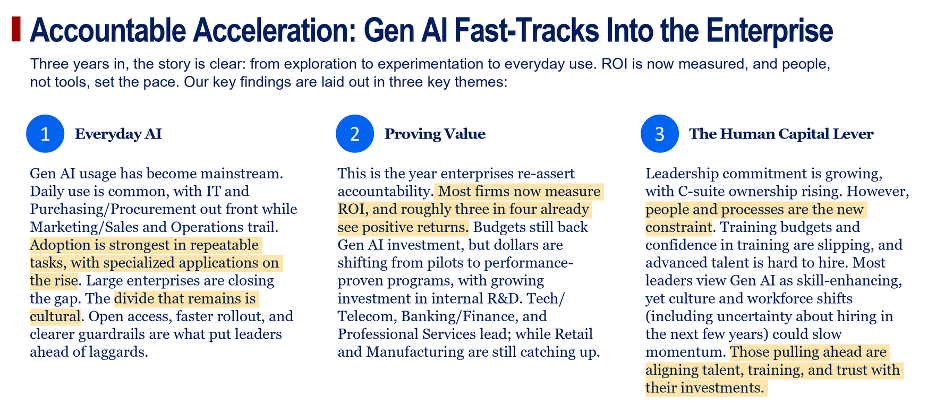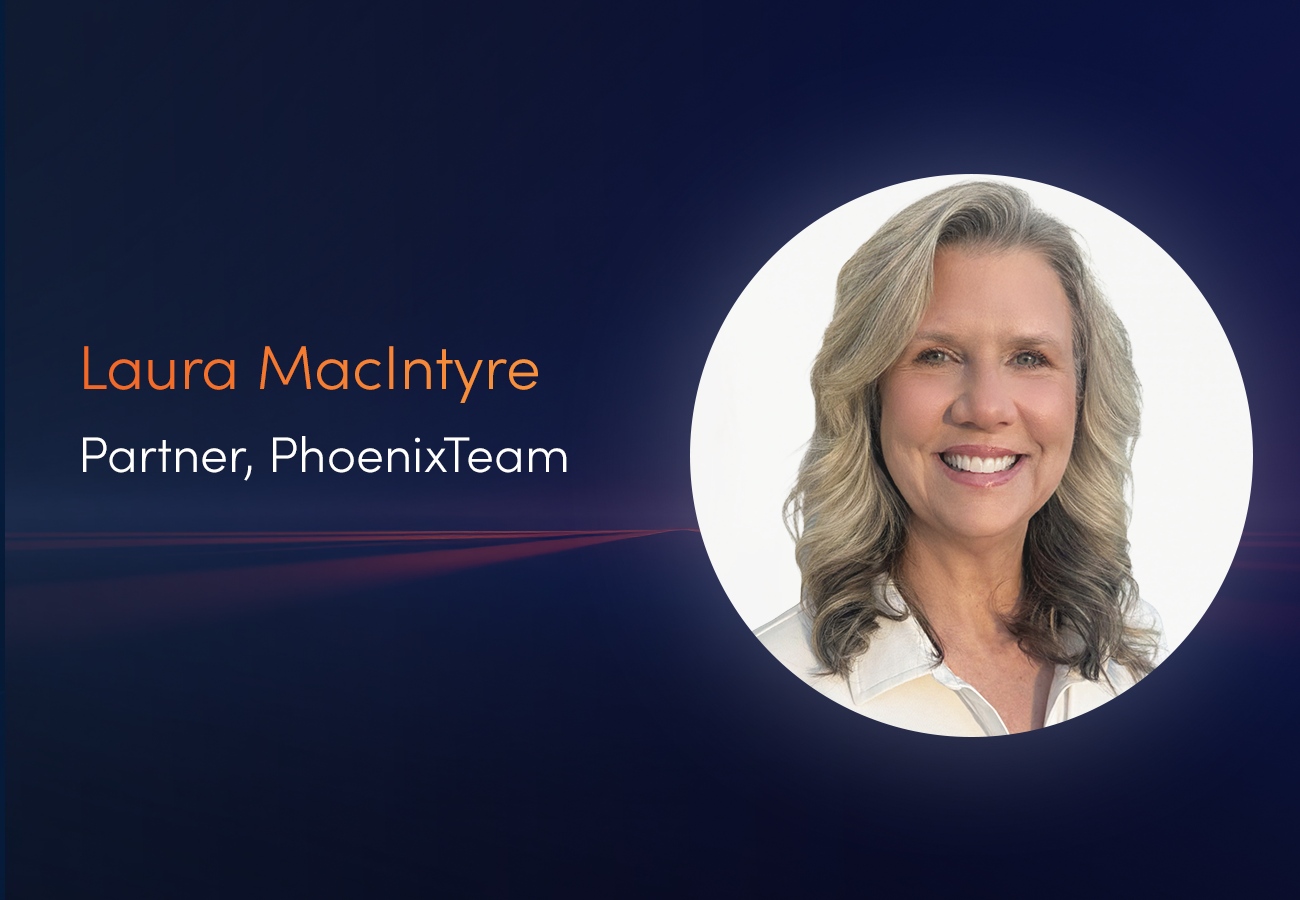
I recently wrote about the now infamous and largely eye-rolled MIT study. You'll remember it's sensational headline that 95% of organizations are getting a zero percent return on their genAI investments. Yikes. I won't rehash that article here, but I will offer an alternative that didn't get quite so much press coverage, and that is a three-year longitudinal study published annually by the Wharton school that had a very different conclusion.
Author's note - I have created a publicly available Google Drive for all the interesting things I find that seem useful for sharing. You should be able to access it, let me know if you cannot.

One of the headlines of the Wharton study was that "most firms now measure ROI, and roughly three of four already see positive returns". Darn-it, the ROI problem continues to be devilishly confounding. This genAI business continues to be such an emotional roller-coaster. So let's dig in, and then I give you my $0.02 on what it means to us in mortgage.
This one was slightly more scientific, it was based on 15 minute online "quantitative" surveys of 800 leaders, and the study has been repeated for each year beginning in 2023, which I have to say was very forward looking of Wharton. I put quantitative in quotations, because while I am sure the data they gathered was numerical, the source of the information was from people describing their experience and, therefore, qualitative.

There was a lot to this first observation that was very validating. I haven't seen a good study on adoption since the Deming study from late 2024 (there is still no better one, unfortunately). Yes, genAI is mainstream. Yes, 46% of leaders are using it everyday and 80% are using it at least weekly. Still, of note, one in six executives surveyed were not using it (I commend them for their honestly). Those executives and companies are in for a cold awakening if they don't join us on the AI train.
Very interesting to note that "practical, repeatable use cases supporting employee productivity" see the most adoption, with IT, legal, and HR being the furthest ahead. I continue to believe that adoption is good, employee productivity is a great place to start, and also the truly differentiating companies will be making their inroads much deeper into operations. Unsurprisingly, the study finds that operations as a business area is among the furthest behind. Well yeah, it's the hardest.
One thing holding us all back, that the study found as a positive, is the idea that "accountability is now the lens". Yes - we need to find the value for sure, and also we are still early. Part of the value is in the learning, and the struggle. We can easily get stuck in a spiral of ROI purgatory when we load up a small set of narrow use cases with the full spend of getting started.
Budgets are moving from "one-off pilots to performance justified investments" and budgets are being moved from existing cost centers to genAI adoption. Again, yes, we need to justify investment, but I'm telling you it should just be one lens, not the sole picture.
One of the headline conclusions here is "budget discipline + ROI rigor are becoming the operating model for genAI investment". This to me is a sign that bean counters (absolutely not judging the bean counters, love the bean counters) are winning the executive perspective.
This was the most interesting section of the study for me, by far. "People set the pace"... I love this, and I could not agree more strongly that this is true. The gap between how we are using genAI (the "everyday AI" that is mainstream) and what it can actually do is a massive chasm.
We are seeing that almost 70% of leaders reported they have some kind of a Chief AI Officer role, indicating that accountability for AI adoption has moved into the C-suite. At the same time that confidence in AI and it's ability to provide value grows, capability is falling short.
"Capability building is falling short of ambition. Despite nearly half of organizations reporting technical skill gaps, investment in training has softened, and confidence in training as the primary path to fluency is down. Some firms are pivoting to hiring new talent, yet recruiting advanced genAI skills remains a top challenge."
Unless you have millions of dollars, recruiting advanced genAI skills is absolutely impossible, especially in mortgage. The only way to get it is to home grow it, or partner for it. And when partnering is chosen, it needs to come with a coaching and "teaching by doing" component. I continue to believe that every organization needs to have in house genAI talent, and that means investing in general education, applied education, education that favors application over attendance. Oh, and learning and applying new ways of thinking.

This is where we see that "people set the pace". In the past few weeks at PhoenixTeam, we have been up to our eyeballs in Phoenix Burst product adoption and workforce enablement, both separately and together. At the heart of adoption is the people. Literally. There is no adoption without the people. I can be guilty of this myself, we focus so much and so hard on the tech and the product and the experience, and we lose sight of the hearts of the people. The fear. The lack of trust. The domain of "change management".
The study echoes "the human side remains the bottleneck and a key potential accelerant. Morale, change management, and cross functional coordination remain persistent barriers. Without deliberate role design, coaching, and time to practice, 43% of leaders warn of skill atrophy, even as 89% believe genIA tools augment work.
I had a great friend say to me last week about adoption struggles, "perhaps it's FOAK?", which I had to look up. (Embarrassed to admit it but here there it is, authenticity is the best route to achieve authentic human connection).

And yes, tying back to the study, for those of us that are working on really challenging areas, where the metrics are not well established, where the tasks are not necessarily repeatable, where the path ahead has to be redesigned -- we are running into FOAK. Taking a step back to think about the people, and learning from what they are telling us is really important. And forging ahead, being adaptable, being resilient, and staying positive.
In no particular order, what I think all this means to us in mortgage:
There is so much happening out there, it's very hard to keep up. I hope you will reach out and share what you are learning and applying, what's working and what's not. We are listening and trying to find solutions.
By Tela Gallagher Mathias, Chief Nerd and Mad Scientist at PhoenixTeam



